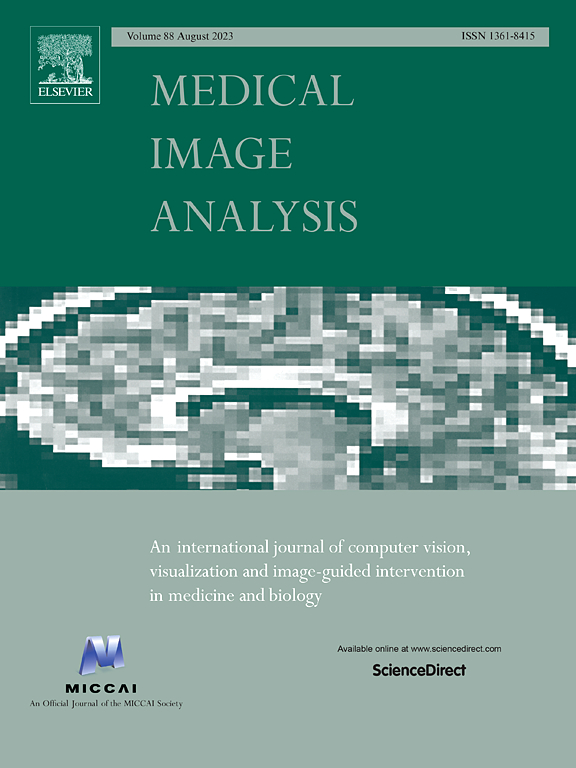An extragradient and noise-tuning adaptive iterative network for diffusion MRI-based microstructural estimation
IF 10.7
1区 医学
Q1 COMPUTER SCIENCE, ARTIFICIAL INTELLIGENCE
引用次数: 0
Abstract
Diffusion MRI (dMRI) is a powerful technique for investigating tissue microstructure properties. However, advanced dMRI models are typically complex and nonlinear, requiring a large number of acquisitions in the q-space. Deep learning techniques, specifically optimization-based networks, have been proposed to improve the model fitting with limited q-space data. Previous optimization procedures relied on the empirical selection of iteration block numbers and the network structures were based on the iterative hard thresholding (IHT) algorithm, which may suffer from instability during sparse reconstruction. In this study, we introduced an extragradient and noise-tuning adaptive iterative network, a generic network for estimating dMRI model parameters. We proposed an adaptive mechanism that flexibly adjusts the sparse representation process, depending on specific dMRI models, datasets, and downsampling strategies, avoiding manual selection and accelerating inference. In addition, we proposed a noise-tuning module to assist the network in escaping from local minimum/saddle points. The network also included an additional projection of the extragradient to ensure its convergence. We evaluated the performance of the proposed network on the neurite orientation dispersion and density imaging (NODDI) model and diffusion basis spectrum imaging (DBSI) model on two 3T Human Connectome Project (HCP) datasets and a 7T HCP dataset with six different downsampling strategies. The proposed framework demonstrated superior accuracy and generalizability compared to other state-of-the-art microstructural estimation algorithms.
基于扩散核磁共振的显微结构估计的梯度和噪声调谐自适应迭代网络
扩散核磁共振成像(dMRI)是一种研究组织微观结构特性的强大技术。然而,先进的dMRI模型通常是复杂和非线性的,需要在q空间中进行大量的采集。深度学习技术,特别是基于优化的网络,已经被提出用于改进有限q空间数据的模型拟合。以往的优化方法依赖于迭代块数的经验选择,网络结构基于迭代硬阈值(IHT)算法,在稀疏重建过程中存在不稳定性。在本研究中,我们引入了一种用于估计dMRI模型参数的泛型网络——梯度和噪声调谐自适应迭代网络。我们提出了一种自适应机制,根据特定的dMRI模型、数据集和下采样策略灵活调整稀疏表示过程,避免了人工选择和加速推理。此外,我们还提出了一个噪声调节模块,以帮助网络摆脱局部最小/鞍点。该网络还包括额外的梯度投影,以确保其收敛。我们在两个3T人类连接组项目(HCP)数据集和一个7T人类连接组项目数据集上用六种不同的降采样策略评估了该网络在神经突方向弥散和密度成像(NODDI)模型和扩散基谱成像(DBSI)模型上的性能。与其他最先进的微结构估计算法相比,所提出的框架具有优越的准确性和通用性。
本文章由计算机程序翻译,如有差异,请以英文原文为准。
求助全文
约1分钟内获得全文
求助全文
来源期刊

Medical image analysis
工程技术-工程:生物医学
CiteScore
22.10
自引率
6.40%
发文量
309
审稿时长
6.6 months
期刊介绍:
Medical Image Analysis serves as a platform for sharing new research findings in the realm of medical and biological image analysis, with a focus on applications of computer vision, virtual reality, and robotics to biomedical imaging challenges. The journal prioritizes the publication of high-quality, original papers contributing to the fundamental science of processing, analyzing, and utilizing medical and biological images. It welcomes approaches utilizing biomedical image datasets across all spatial scales, from molecular/cellular imaging to tissue/organ imaging.
 求助内容:
求助内容: 应助结果提醒方式:
应助结果提醒方式:


